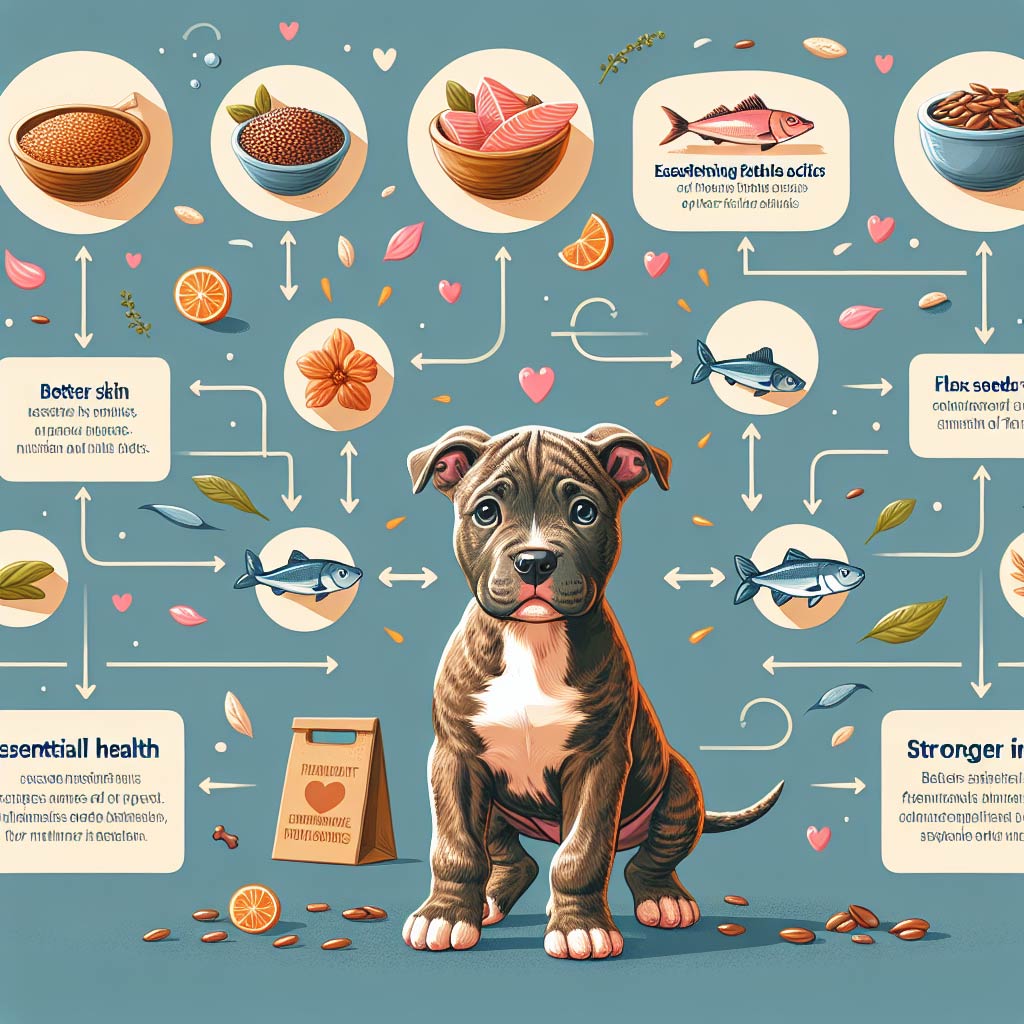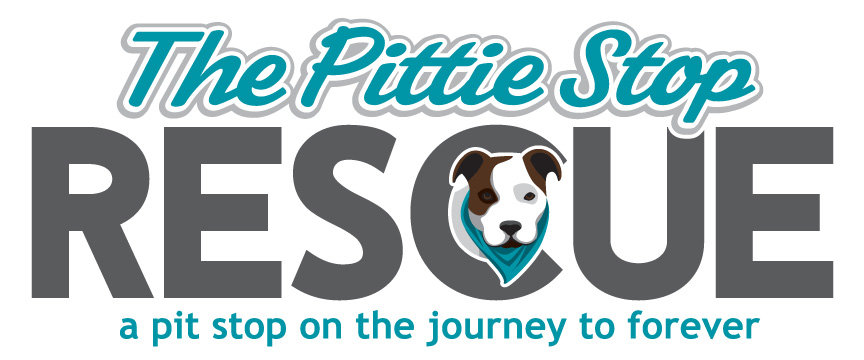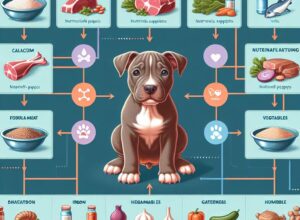
Fueling Growth and Health: Essential Fatty Acids for Pitbull Puppies
When it comes to raising a healthy and vibrant pitbull puppy, nutrition is key. Essential fatty acids, particularly Omega-3 and Omega-6, are the building blocks for a robust immune system, a shiny coat, and a sharp mind. These nutrients are crucial for your growing pitbull’s development and can set the stage for a long, healthy life.
Why Essential Fatty Acids are Non-Negotiable
Think of essential fatty acids as the secret sauce to your pitbull puppy’s well-being. They’re called ‘essential’ for a reason – your puppy’s body can’t make them on its own. These fats are vital for cellular growth, eye development, and brain function. They also play a significant role in reducing inflammatory responses, which can be particularly beneficial for active breeds like pitbulls that are prone to joint issues.
Spotting Deficiencies: Signs Your Puppy Needs More
How do you know if your pitbull puppy is getting enough essential fatty acids? Keep an eye out for signs that could indicate a deficiency. If you notice your puppy has a dull coat, dry skin, or is prone to infections, it’s time to reassess their diet. Other red flags include slow wound healing and a lack of energy – these can all suggest your puppy’s diet may be lacking in these vital nutrients.
The Power of Omega-3 and Omega-6
Omega-3 and Omega-6 fatty acids are the superheroes of the fat world. They’re not just good fats; they’re great for your pitbull puppy’s health. Omega-3 fats, found in fish oils and flaxseeds, are known for supporting brain development and reducing inflammation. Omega-6 fats, which are abundant in poultry and eggs, are essential for skin health and hormone production.
Boosting Brain Power and Trainability
Did you know that a diet rich in Omega-3 fatty acids can actually make your pitbull puppy smarter? These fats are integral to brain health, leading to improved cognition and better trainability. In fact, studies have shown that puppies fed a diet with ample Omega-3s are more attentive and perform better in training exercises. So, if you want a top-notch companion that’s quick to learn new tricks, make sure Omega-3s are on the menu.
Creating a Silky, Healthy Coat
One of the most visible benefits of essential fatty acids is the remarkable impact they have on your pitbull puppy’s coat. Omega-6 fatty acids, in particular, play a crucial role in maintaining the skin’s barrier function and reducing water loss. A diet with the right balance of these fats will give your puppy a coat that’s not just shiny, but also resilient against irritants and less prone to shedding. It’s the kind of healthy glow that gets your pup noticed in the dog park!
Supporting a Strong Immune System
Essential fatty acids are like the unsung heroes of the immune system. They contribute to the production of prostaglandins, which help regulate the body’s inflammatory response to infection and disease. This means that with a diet rich in Omega-3 and Omega-6, your pitbull puppy is better equipped to fend off sickness and recover more swiftly from any ailments they might encounter.
Top Sources of Essential Fatty Acids
Knowing the importance of essential fatty acids is one thing; understanding where to find them is another. The good news is, there’s a variety of sources you can incorporate into your pitbull puppy’s diet to ensure they’re getting a healthy dose of these fats. From animal-based options like fish oil to plant-based alternatives, let’s explore the best sources to keep your puppy thriving.
Fish Oil: A Potent Source of Omega-3
Fish oil is renowned for its high concentration of Omega-3 fatty acids, particularly EPA and DHA. These are the types of Omega-3s that have a direct impact on your puppy’s cognitive development and joint health. Adding fish oil to your pitbull’s diet can be as simple as mixing a high-quality supplement into their food, ensuring they reap all the benefits these essential fats have to offer.
Flaxseed and Canola Oil: Plant-Based Omega Alternatives
For those looking for plant-based sources of Omega-3, flaxseed and canola oil are excellent options. While they predominantly contain ALA, another type of Omega-3, the body can convert it into the EPA and DHA it needs, albeit not as efficiently as when provided directly. Incorporating these oils into your puppy’s diet is a great way to diversify their sources of essential fatty acids and support their overall health.
Chicken Fat and Other Meats: Balancing Omega-6 Intake
While Omega-3s often steal the spotlight, Omega-6 fatty acids are just as essential for your pitbull puppy’s diet. Chicken fat, beef, and pork are all rich in Omega-6 and provide the energy and vital nutrients your growing pup needs. These sources not only contribute to a strong immune system but also support reproductive health and vibrant skin. Remember, balance is key; too much Omega-6 can lead to inflammation, so it’s important to strike the right balance with Omega-3s to keep your puppy in tip-top shape.
Integrating Fatty Acids into Your Pitbull Puppy’s Diet
Now that we’ve covered the why and the what, let’s talk about the how. Integrating essential fatty acids into your pitbull puppy’s diet doesn’t have to be complicated. Start with a high-quality commercial puppy food that lists sources of Omega-3 and Omega-6 fats among its ingredients. Then, consider supplementing with additional sources like fish oil or flaxseed to ensure your puppy is getting a comprehensive array of these crucial nutrients.
Understanding the Right Ratios
The key to maximizing the benefits of essential fatty acids is getting the ratios right. The ideal balance of Omega-6 to Omega-3 fatty acids in a dog’s diet is generally considered to be between 5:1 and 10:1. Keeping within this range helps to prevent an excess of either type of fat, which can lead to health issues. Check the labels on your puppy’s food and supplements, and consult with your vet to ensure your pitbull is getting the optimal balance for their individual needs.
Safe and Effective Supplementation Practices
Supplementing your pitbull puppy’s diet with essential fatty acids can be a game-changer, but it’s crucial to do it safely. Always opt for supplements that are specifically formulated for dogs, as human supplements may contain ingredients that are harmful to your pup. Start with the recommended dosage on the product label or the amount advised by your vet. And keep an eye out for any changes in your puppy’s health or behavior, adjusting their intake as necessary.
Key Takeaways
- Essential fatty acids are crucial for your pitbull puppy’s development, supporting everything from brain function to skin health.
- Signs of fatty acid deficiency include a dull coat, dry skin, and a lackluster immune response.
- Omega-3 and Omega-6 fatty acids each play unique roles in your puppy’s health and should be balanced appropriately.
- Chicken fat and other meats are good sources of Omega-6, but it’s important to balance them with Omega-3 sources to avoid inflammation.
- Integrating essential fatty acids into your puppy’s diet involves choosing high-quality foods and supplements, and understanding the right ratios for optimal health.
- When supplementing, choose dog-specific products and follow recommended dosages to ensure your puppy’s safety and well-being.
Frequently Asked Questions (FAQ)
How much omega-3 and omega-6 does my pitbull puppy need daily?
The exact amount of omega-3 and omega-6 fatty acids your pitbull puppy needs can vary based on their size, age, and overall health. As a general guideline, the National Research Council suggests that dogs require a minimum of 0.5% of their total daily energy to come from omega-6 fatty acids. For omega-3s, while there’s no established minimum requirement, providing a balanced ratio of omega-6 to omega-3, which is between 5:1 and 10:1, is crucial. Always consult with your vet to determine the specific needs of your puppy.
Can I give my puppy human fish oil supplements?
While human fish oil supplements might seem like a convenient source of omega-3 for your puppy, it’s not always the best idea. These supplements can contain higher doses than your puppy needs and may include additives that aren’t safe for dogs. To ensure the health and safety of your pitbull puppy, stick to fish oil supplements designed for dogs, which are formulated to provide the appropriate dosage and purity levels.
Are there any risks to giving my pitbull too many fatty acids?
Yes, there are risks associated with excessive intake of fatty acids. Too much omega-6 can lead to inflammation and contribute to health issues, while an overload of omega-3 can cause a blood-thinning effect and potentially interfere with wound healing and immune function. It’s all about balance. Stick to recommended doses and keep an eye on your puppy’s response to their diet, adjusting as needed with guidance from your vet.
How can I tell if my pitbull puppy is getting enough fatty acids from their diet?
To gauge if your pitbull puppy is getting enough fatty acids, observe their overall health and appearance. A shiny coat, smooth skin, and good energy levels are indicators of adequate fatty acid intake. If you’re unsure or notice signs of deficiency, such as a dull coat or dry skin, consult with your vet. They can perform tests to assess fatty acid levels and recommend dietary adjustments to ensure your puppy is getting what they need.
Is it better to opt for natural sources or supplements for essential fatty acids?
When it comes to essential fatty acids, variety is the spice of life—and health. Natural sources such as fish, flaxseeds, and chicken fat provide a complex array of nutrients along with fatty acids, which can be beneficial for overall health. However, supplements can be a powerful tool to ensure your pitbull puppy gets the exact amount of Omega-3 and Omega-6 they need, especially if they have specific health concerns or dietary restrictions. The best approach is often a combination of both: a high-quality commercial diet enriched with natural sources, complemented by supplements to fill any gaps.
In conclusion, the journey of raising a healthy pitbull puppy is filled with joy and responsibility. Essential fatty acids are a cornerstone of your puppy’s diet, contributing to their growth, brain development, and overall well-being. By understanding the signs of deficiency, the power of Omega-3 and Omega-6, and the best sources for these nutrients, you’re well on your way to nurturing a thriving, happy pitbull companion.
Remember, balance is key. Too much of a good thing can be harmful, so it’s important to provide these fatty acids in the right ratios and dosages. Always consult with your vet before making changes to your puppy’s diet, especially when it comes to supplements.
Armed with knowledge and a commitment to your puppy’s health, you’re not just a pet owner—you’re a guardian of their future. Here’s to a life full of wagging tails, wet noses, and the unmistakable bond that grows stronger with every healthy meal you provide for your beloved pitbull puppy.
Frequently Asked Questions (FAQ)
How can I ensure my pitbull puppy is getting the right balance of essential fatty acids?
Monitor your puppy’s diet closely and look for commercial dog foods that list Omega-3 and Omega-6 fatty acid sources in their ingredients. If you’re using supplements, follow the dosing instructions or consult with your vet for personalized advice. Watch for signs of good health, such as a shiny coat and active behavior, as indicators that your puppy’s diet is on track.
Can I give my pitbull puppy the same Omega supplements I take?
It’s not recommended to give your puppy human supplements, as they may contain ingredients and dosages that aren’t suitable for dogs. Always choose supplements specifically designed for canine consumption to ensure safety and efficacy.
What should I do if I suspect my pitbull puppy has a fatty acid deficiency?
If you suspect a deficiency, consult with your veterinarian. They can recommend dietary adjustments or supplements to address the issue and may perform tests to confirm the deficiency.
How often should I adjust my pitbull puppy’s diet to include essential fatty acids?
Essential fatty acids should be a consistent part of your puppy’s daily diet. If you make any changes, do so gradually and under the guidance of a veterinarian to ensure your puppy’s digestive system can adapt without distress.
Are there any specific brands of dog food you recommend for essential fatty acid content?
While I cannot endorse specific brands, look for high-quality dog foods that list sources of Omega-3 and Omega-6 fatty acids, such as fish oil, flaxseed oil, or chicken fat, among their top ingredients. Always choose products that meet the AAFCO standards for complete and balanced nutrition.
What are the long-term benefits of a diet rich in essential fatty acids for my pitbull puppy?
A diet rich in essential fatty acids can lead to a lifetime of benefits for your pitbull puppy, including a robust immune system, healthy skin and coat, improved cognitive function, and better joint health. These nutrients lay the foundation for a strong, vibrant, and healthy life.
By focusing on the right balance of essential fatty acids in your pitbull puppy’s diet, you’re investing in their health and happiness. It’s a simple step that can have profound effects on their quality of life, now and for years to come. Happy, healthy feeding!



